
Sea-Doo certainly knows how to ring in the announcement of a whole new lineup of watercraft, and for 2020 the industry leader definitely pulled out all the stops. Sea-Doo had The Watercraft Journal with a handful of other media, including our friend, Jerry Gaddis from Greenhulk.net out on Lake Travis just west of Austin, Texas for a few days to test ride the all-new GTI lineup.
Replacing the entirety of its Recreation segment, Sea-Doo’s completely redesigned GTI looked to target the market’s most active segment with everything they’ve always asked for: storage, stability and peace of mind. From the outset, Sea-Doo knew it was going to implement several of the changes and additions made to the full-sized ST3 plaform in 2018 – particularly adding the modular LinQ accessory system to the rear of the watercraft.

Using the same 16-inch-on-center LinQ mounts that collapse flush to the deck, the new GTI models can use any and all of the LinQ accessories listed in the Sea-Doo Parts & Accessories catalog – that includes both the standard 4.2-gallon cooler, the fuel caddy or the retractable ski pylon – heck, you can even strap down the massive 13.5-gallon Fish Pro cooler to the new GTI!
Equally, the back seat can be removed – like the larger ST3 – revealing an extended rear platform 36% larger than the previous model’s, ideal for lounging around or 1-up, single-person riding. Again, it’s all up to you. For the rider, Sea-Doo made sure to integrate its industry-leading Ergolock seating; coves at the knees tuck in, letting the driver sit naturally, with super-deep footwells so your knees don’t feel either pressed into your chest or spread apart uncomfortably.
Even the passenger enjoys improved ergonomics with better footing, reduced rubbing at the knees thanks to the GTI’s Coke bottle-like bench seat, and revised hand grips. It’s the little details that abound throughout the GTI that make it all that much better.
Although we’re getting ahead of ourselves, other touches include dock line loops molded into the upper deck just under the handle bars; and hand grips molded into the bow of the hull that make pulling your new GTI up on to the sand a breeze. And if you’re going to tow the kids on a raft – or God forbid another PWC back to the marina – a metal tow eye is mounted just above the bond rail.

Back to the driver: the cockpit for the GTI features a new 4.5-inch digital display that can be set with an orange backlight, replacing the out-going analog gauges. The display isn’t terribly flashy, but is wholly serviceable reading off the vitals. While toggling through the many iControl features, particularly Sea-Doo’s Slow Mode, all of the presets are clearly visible. Slow Mode acts as a speed regulator, permitting the driver – when the GTI set at neutral – to program a low “no wake” speed for idling through marinas or the like.
Found on the left hand side of the handle bars, on the same toggle pad as the GTI’s Variable Trim System (VTS), Sea-Doo lets the operator choose from several low speed presets, from a near dead crawl to upwards of 9 miles per hour. When used while under way (meaning while moving forward under throttle), engaging Slow Mode artificially caps the GTI’s top speed, giving you an ideal feature for novices learning to operate the GTI.
Below the handlebars is one of the GTI’s shining features, a massive 2.3-gallon glove box – that includes the same watertight phone storage case as the aforementioned ST3 runabouts. Although not standard equipment on any GTI, the same rubber plug can be replaced with a USB port to keep your phone charged.
And you’re gonna want to keep it charged if you option for the BRP Premium Audio System. All but identical to the same system used on its larger siblings, the 100-watt Bluetooth-controlled Premium Audio package is best ordered from the factory, as it also doesn’t come as standard equipment on any of the new GTI models. Touting some of the best sound from an onboard factory-installed system, the control pad is tucked in pretty tight to the fairings, making it tough to reach even when you’re sitting still. It’s a minor complaint, but we know we’re not alone on this one.
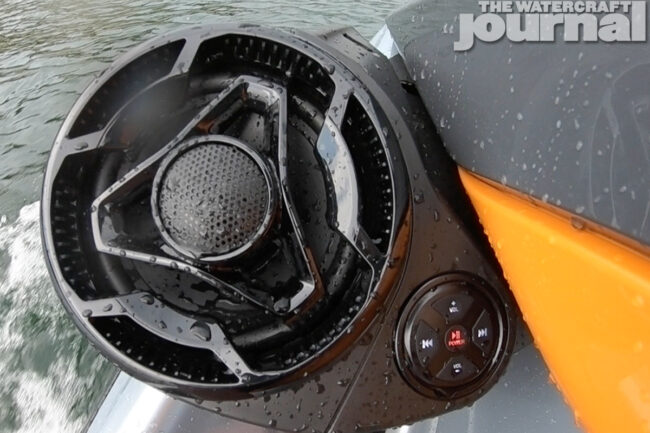
At the nose is a very generous bow compartment giving the new GTI a slam-dunk 42.5-gallons of storage – giving this little Recreation-segment machine waaay more capacity than even the full-sized Sea-Doos. Under the seat is just as exciting. Sea-Doo finally retired the last of its 130 and 155-horsepower 1503 Rotax engines for 2020. In its stead is a stout 1,630cc naturally-aspirated ACE 1630 3-cylinder, cranking out either 130 or 170-horsepower all while sipping on 87-octane fuel; making it the most powerful naturally-aspirated engine ever produced by Rotax.
The larger displacement and added 15-horsepower gives the 170 variant a 20% improvement in acceleration over the previous 155. According to Sea-Doo, this means that the new GTI 170 can hit 50 miles per hour in 5.2-seconds; smoking the outgoing 155-horse GTI’s paltry 6.6 second run. Aboard our GTI SE 170, we managed a respectable top speed of 55 miles per hour at 7,700rpm. No, speeds like that aren’t going to set the internet on fire, but hey, this machine ain’t trying to break any world records, man.
Of course, the biggest change for 2020 is also the one that Sea-Doo has been preparing for the longest: the standardization of Polytec. Yes, for 2020, Sea-Doo has replaced all of the hulls of the GTI-based machines with Polytec, including the 170-horsepower GTI SE we had today, the Wake 170 and even the supercharged GTR 230, which we reviewed earlier.
Called Polytec 2.0, this new hull is quite literally double the thickness of previous hulls (from a quarter inch to half an inch thick), and employs what Sea-Doo likes to call a fiberglass “inner skin” – which are more or less fiberglass stringers running the length of the inside of the hull giving the hull added strength and “robustness.” Nevertheless, the new GTI SE 170 comes in 739-pounds, an impressive 51-pounds less than last year’s GTI SE 155, tipping the scales at 790-pounds.

We were able to corner BRP Global Product Specialist Manager, James Heintz – and even convinced him to be our in-water cameraman, who explained that one of Sea-Doo’s primary goals was to have an infrastructure ready for dealers and shops to properly and professionally repair the new hulls.
“We partnered with one of the world’s leaders in plastic welding and repair, Leister Plastic Welding, to develop a system wherein our technicians could properly repair, and restore the Polytec hull to its previous appearance and full use,” Heintz explained. “After years of testing and development, we found that the repaired portion was stronger than the hull itself.”
“Equally, we also reduced the cost of replacing a Polytec hull by half,” Heintz continued. “So if the damage to the hull is beyond repair or would be cost ineffective to repair it, purchasing a replacement hull is now – in many cases – thousands of dollars less than just a year before.”
Of course, what really matters is how the 2020 GTI SE 170 rides. What we found was actually quite impressive. We somewhat expected the Polytec hull to flex and bounce along like an oversized Spark, but that was absolutely not the case. Instead, the new GTI tracked true, predictably and comfortably through lake chop and chatter.
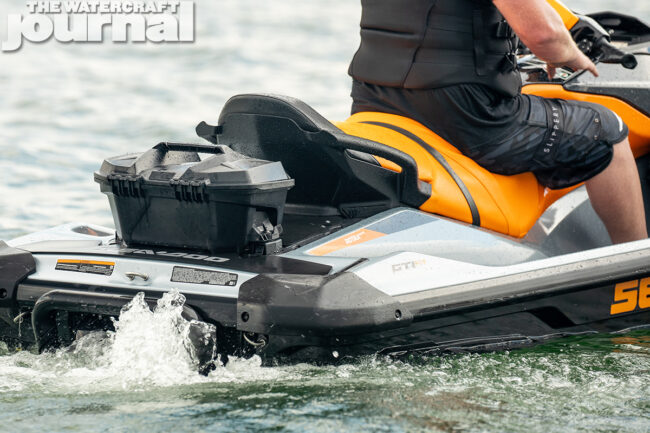
Equally, it’s nowhere near as loose as the flatter, somewhat sportier hull shape it replaces. Rather, the new GTI is far more stable and manages to keep its footing even when pressed. That’s not to say you’re can’t spin the tail out without the right amount of coaxing – because c’mon, who doesn’t love cutting a few donuts?
In all, the 2020 Sea-Doo GTI SE 170 is one of the most well-balanced entries into this hotly contested segment. With a listed MSRP of $11,399 (that’s not including the BRP Premium Sound System), it even comes in the several hundred dollars less than Yamaha’s top selling VX Cruiser HO. With options abounding like two engine output ratings, the available BRP Premium Audio System, and even a choice of livery – Ice Metal and Orange Crush, and Beach Blue Metallic and Lava Grey – the GTI SE 170 is really a customizable machine to fit everyone’s needs.



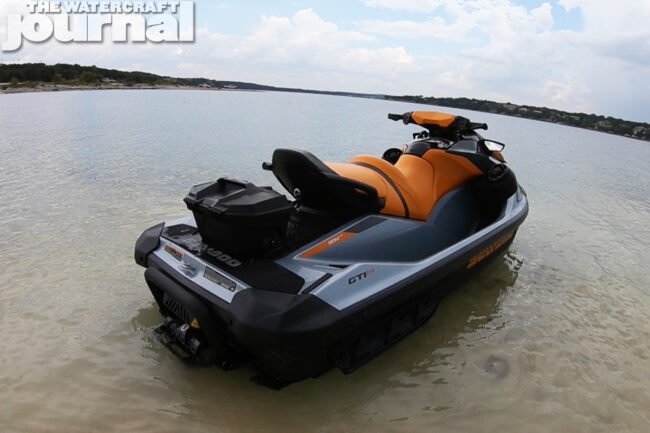


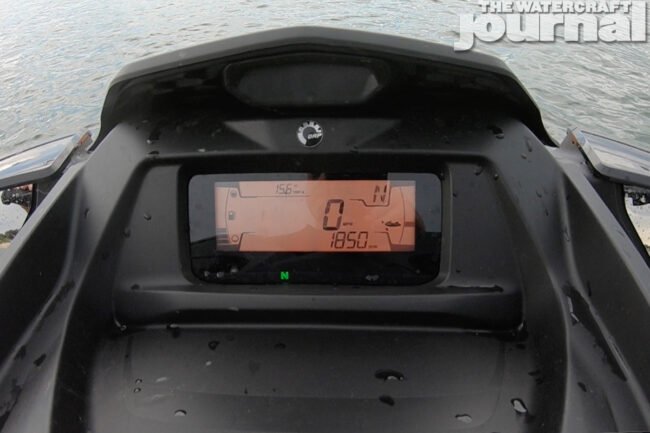

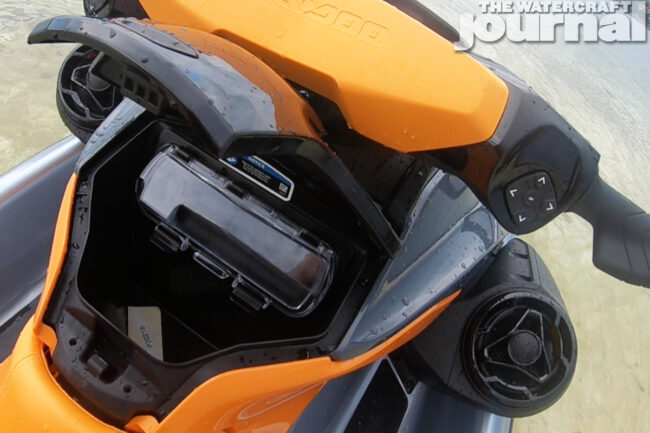
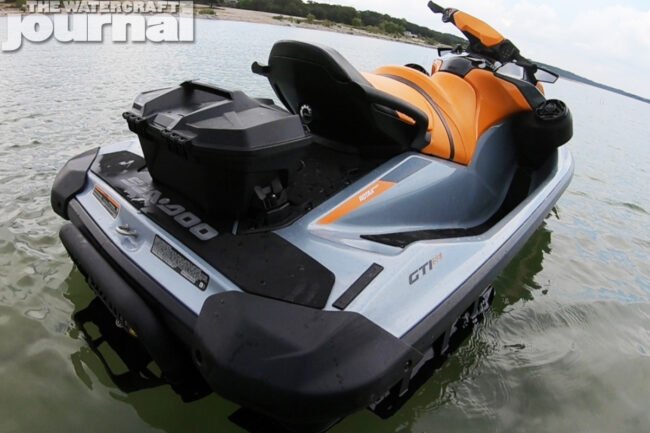
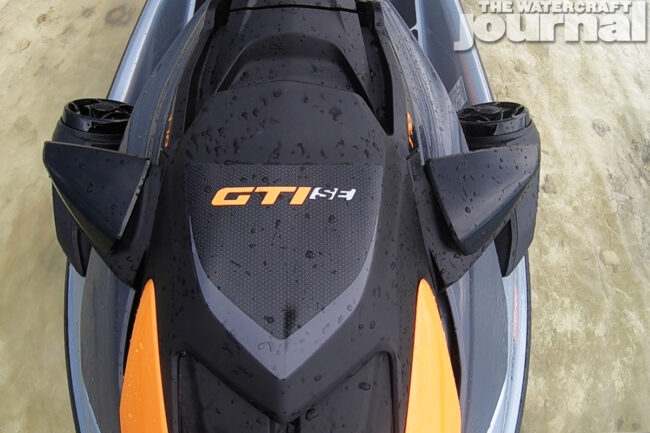


























[…] the latest Sea-Doo watercraft at a show near you. Check out all of the new designs including the Brand New GTI and find some great offers that can be found exclusively through the boat shows including 4-year […]
[…] check out the latest and greatest jet ski models that Sea-Doo has to offer. New designs, like the new GTI, will be on display at these shows, and you can even score 4-year warranty coverage and […]
[…] – almost flat – second half. This gives the ST3 phenomenal balance and buoyancy at low speeds. The 2020 GTI, on the other hand, is entirely new for this year and rides on a very unique hull. The shape itself is tremendous, well balanced and predictable with a progressive 17-degree […]